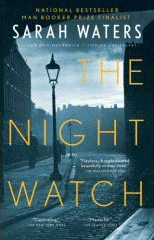Review: The Night Watch by Sarah Waters
The Night Watch, a novel by Sarah Waters nominated for Britain's prestigious Man Booker Prize, has been written with an enthralling narrative gimmick. Divided into three sections, it tells the story of six characters in wartime London beginning in 1947, stepping back to 1944 and finishing in 1941. You learn where they ended up by page 150 and spend the next 300 pages finding out how they got there. This turns the events of the story on their head in interesting ways. When one of the characters remarks during the war that "we might all be dead tomorrow," you know they won't. Their fatalism falls on deaf ears; German planes drop bombs night after night that will never find them. As a cheating husband tells his mistress "you wait until after the war ... it'll be the Ritz and the Savoy then, every time," you've already learned with certainty that it's an empty promise.
This turns the events of the story on their head in interesting ways. When one of the characters remarks during the war that "we might all be dead tomorrow," you know they won't. Their fatalism falls on deaf ears; German planes drop bombs night after night that will never find them. As a cheating husband tells his mistress "you wait until after the war ... it'll be the Ritz and the Savoy then, every time," you've already learned with certainty that it's an empty promise.
The story's constructed as a mystery in which the details of the characters' lives are the mystery, so describing them individually would ruin surprises. The six are ordinary people living in London, dealing with World War II and tied together by romance or coincidence. Four of the six are gay -- one newspaper reviewer claims Waters has the literary goal of "writing lesbians back into history" -- but the novel builds on universal romantic obstacles like jealousy, self-esteem and guilt rather than issues particular to sexual orientation.
The author Martina Cole paid £1,000 pounds in a charity auction to be a character in the book. Her money bought her E.M. Cole, a female ambulance driver protective of her cigarettes who has disreputable friends selling black market coffee, soap and lingerie.
The Night Watch is an excellent novel with some violence and biblically unsanctioned sexual content that might turn off James Dobson but not Ted Haggard. I haven't read a book with literary aims this ambitious in years, and clearly I'm missing out.
Comments
That newspaper reviewer claims Waters has the literary goal of "writing lesbians back into history", implying that there's some sort of opprobrium attached. What's wrong with that? Especially when we have people like Fred Phelps running around, who actually get a platform for their hate speech from Fox.
I have read a few reviews. Not bad. Not bad at all..
Regards,
Ames Tiedeman
I think that in saying that Waters' literary goal was to, "write lesbians back into history.", the reviewer wasn't portraying that it was a bad thing. The point was probably to remind us that Sarah Waters is writing lesbians back into history as real people, with real romances, just like heterosexual lives and romances. That Waters' goal is to portray that lesbians are not now and never have been any different than heterosexuals.
Add a Comment
All comments are moderated before publication. These HTML tags are permitted: <p>, <b>, <i>, <a>, and <blockquote>. This site is protected by reCAPTCHA (for which the Google Privacy Policy and Terms of Service apply).

